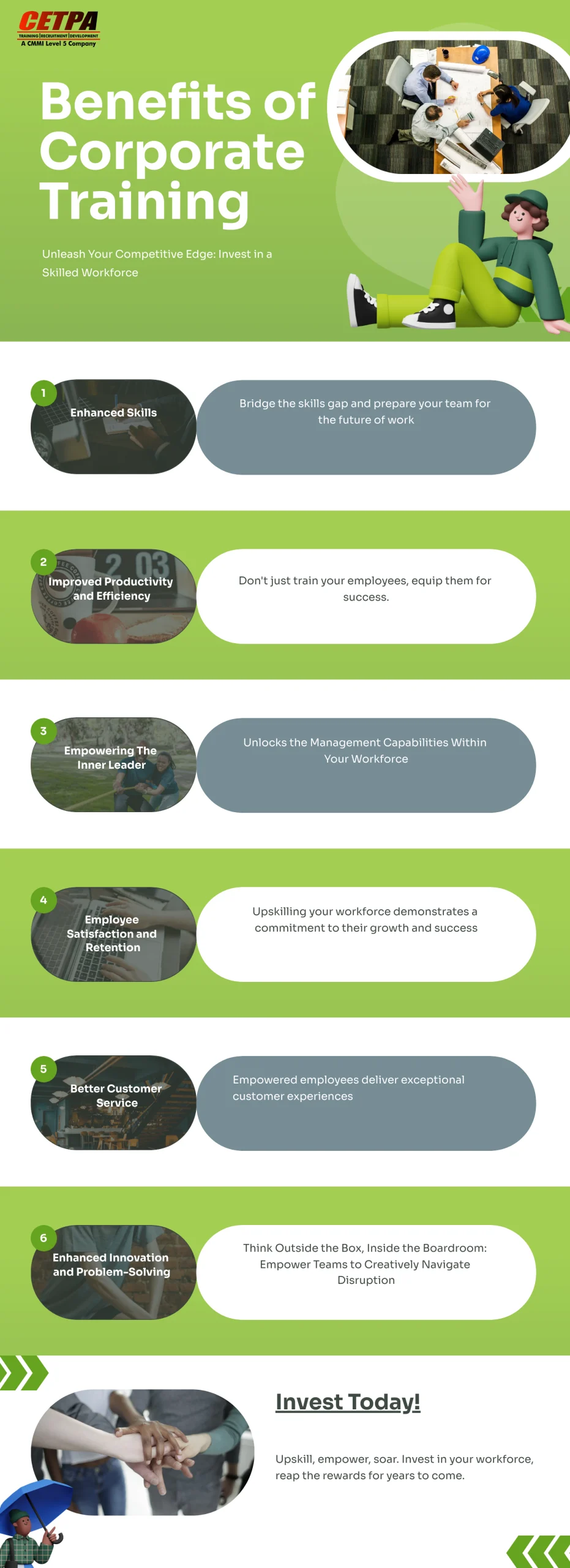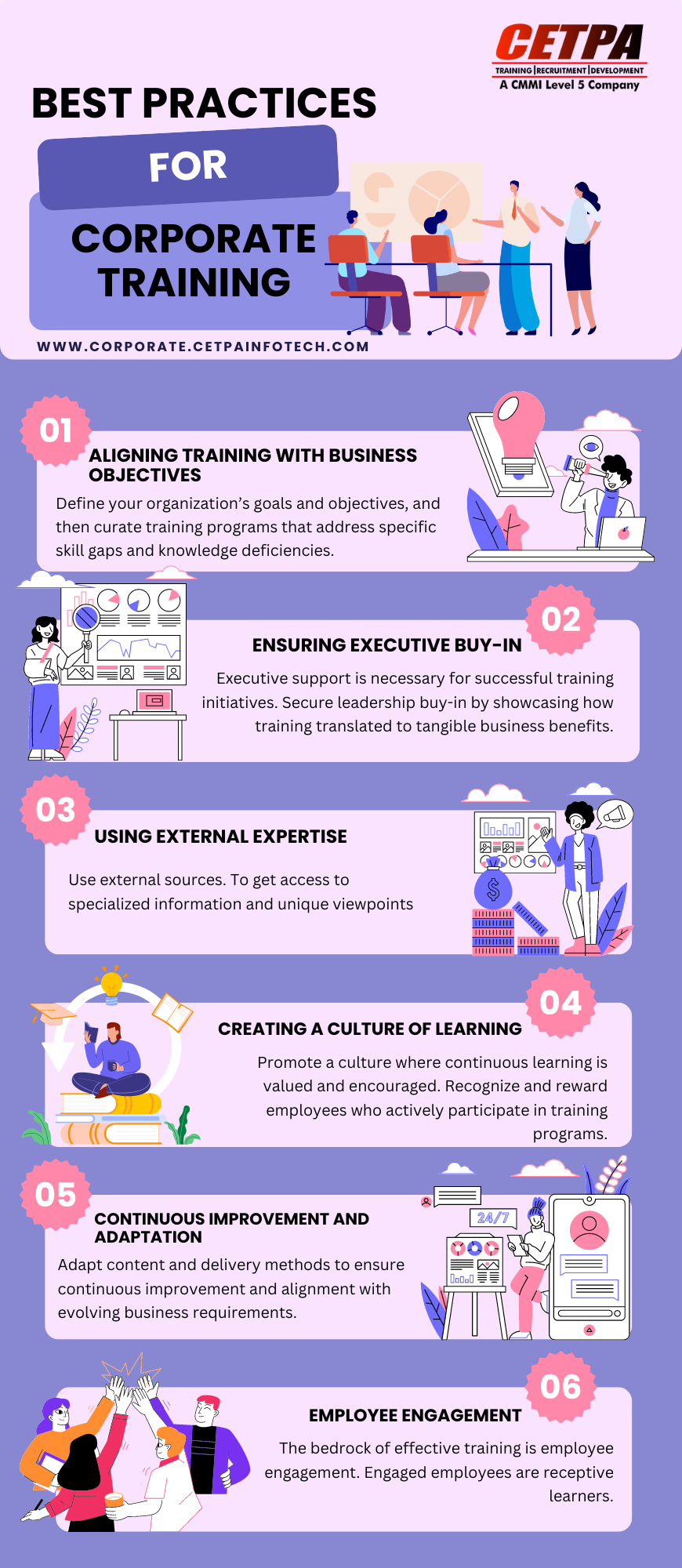Do you feel stuck in your professional career? Corporate training could be your key to unlocking fresh skills and career growth opportunities! Imagine interactive workshops that enhance your confidence, online courses that align with your busy schedules, and networking prospects that open doors to lucrative opportunities.
Corporate training is not just about lectures anymore. It’s about engaging simulations, gamified learning, and personalized development plans. So, are you prepared to develop into a more capable leader, an expert in data, or a master of communication? Let’s explore the intriguing world of corporate training and see how it can revolutionize your professional trajectory!
What is Corporate Training?
Corporate training refers to a comprehensive program designed to improve the skills, knowledge, and competencies of employees within an organization. It aims to enhance individual and organizational performance by offering targeted learning experiences.
These programs may encompass diverse forms of education, like workshops, seminars, online courses, and hands-on training sessions, covering topics from technical skills to soft skills such as leadership and communication. By investing in a corporate training program, companies ensure their workforce remains competitive, adaptable, and capable of meeting the ever-evolving demands of the business world.
What Is The Benefits of Corporate Training
Envision yourself excelling in your role, brimming with confidence, and handling new challenges seamlessly. That’s the power of corporate training! But beyond personal growth, it’s a win-win situation for both you and your organization. Come, let’s explore the significance and key benefits of investing in a corporate training program:
Enhanced Skills and Latest Knowledge:
The business world is actively evolving. A corporate training program is essential because it equips professionals with the latest industry knowledge and in-demand skills. This further benefits them in staying at the forefront of their field.
Improved Productivity and Efficiency:
A well-trained workforce understands processes better, makes fewer errors and completes tasks more efficiently and effectively. Thus, a structured employee training program is important as it significantly boosts a company’s overall productivity.
Empowering The Inner Leader:
Leadership development courses help develop strong communication, problem-solving, and decision-making skills. This helps professionals stand out as a more effective leader and a valuable asset to any team.
Employee Satisfaction and Retention:
Investing in your employees’ growth through corporate training programs showcases that you value their contributions. This promotes a culture of learning and development, resulting in higher employee satisfaction and minimized turnover.
Better Customer Service:
A top-rated corporate training program empowers customer-facing employees to deliver exceptional service experiences. This results in higher customer loyalty and satisfaction.
Enhanced Innovation and Problem-Solving:
Till now, it has been very clear that the benefits of corporate training are diverse. Another item on the list is that training programs that encourage collaboration and creative thinking can stimulate innovation in your teams. This leads to new ideas and solutions for complex challenges.
Hence, corporate training programs aren’t a one-size-fits-all approach. Top-rated organizations offer a range of programs to cater to diverse needs and learning styles. So, take charge of your professional growth and explore the training options available to you. Remember, it’s an investment that will pay off in the long run for both you as well as your organization!
What Are the Key Types of Corporate Training Programs?
Until now you might have been well acquainted with the importance of corporate training programs. However, you might need clarification about which training program is the right one for you. Well, you need not worry anymore! Let’s explore different types of corporate training designed to equip you with the essential skills required for the evolving workplace environment.
| Types of Training | Description |
| Orientation & Onboarding | Orientation and onboarding are the first corporate training sessions that any new hire receives. It guarantees a seamless transition into the company. These programs extend a warm welcome to the new employees and offer an overview of the organization. The key topics involve the company’s vision and values, workplace culture training, and an introduction to the leadership team. |
| Compliance & Regulatory | Compliance training is one of the most essential corporate training programs that teaches employees about the rules and legislation relevant to their line of work or business. An effective compliance training program not only offers professionals knowledge about legal and regulatory needs but also significantly minimizes risk, improves working conditions, and preserves a company’s positive reputation. |
| Managerial | Companies provide specialized managerial training to prepare experienced employees seeking higher roles. This training equips them with essential leadership skills, ensuring they are ready to meet the demands of new responsibilities and progress in their careers seamlessly. |
| Leadership Skills | Elevate your managerial competence with the leadership skills training that fosters team development and enhances your ability to inspire, persuade, and lead confidently while focusing on personal and team growth. |
| Technology-Based | Technical training guarantees that employees are proficient and up to date on the most recent advances in technology, which is essential for successfully performing jobs in the face of fast technological changes. These programs are critical for onboarding and continuous growth of employees, improving skills and knowledge throughout the organization. |
| Soft Skills Development | Research shows that 75% of long-term job success is because of soft skills, essential across all industries. Key skills such as ownership, conflict resolution, time management, and business etiquette are essential for effective workplace interactions and must complement technical training. |
| Product Specific | This particular training focuses on educating the workforce about a company’s products or services. Typically provided to new hires post-orientation or during product launches, this training ensures that employees can efficiently assist clients by thoroughly understanding the offerings. |
| Health, Safety & Security | This specific training concentrates on health, safety, and security, teaching employees to prevent work-related accidents. While essential for high-risk industries such as factories, it’s often overlooked. Even low-risk businesses benefit, as training encompasses emergency preparedness for events such as earthquakes or fires. |
| Mandatory Training | Employees must follow industry-specific standards and attend necessary training sessions, which include tailored programs for recruits and state-mandated sexual harassment training for both public and private firms. This ensures they adhere to workplace norms and regulatory regulations. |
How Are Effective Corporate Training Programs Designed?
Envision a training program that sparks your employees’ passion, hones their abilities, and elevates them to peak performance. That’s the power of a well-designed corporate training program! But how can one achieve this magic? Well, the following is a roadmap to designing an effective corporate training program:
- Thorough Assessment & Training Gap Analysis: To begin with, the first step is to determine the gaps! Through surveys, interviews, and performance evaluations, pinpoint areas where the employees require improvement. This evaluation sets the stage for targeted training.
- Setting Training Goals: Where do you envision your team to be? As a part of diverse corporate training strategies, it is essential to clearly define specific, measurable, achievable, relevant, and time-bound goals for the training program. What knowledge or skills must employees acquire by the end of the program?
- Developing Training Content: The third step is curating the content! To design effective corporate training, it is paramount to tailor the material to the concerned audience’s needs and learning styles. This may involve developing engaging presentations, interactive exercises, or case studies relevant to real-world scenarios.
- Choosing Training Methods: How do you wish to deliver the knowledge? Explore a range of corporate training methods to cater to diverse learning styles. Options involve instructor-led workshops for hands-on practice, eLearning modules for self-paced learning, or a blended approach combining both.
- Implementing The Training Strategies: Let’s get going! Effectively implement the corporate training methods you’ve chosen. Ensure a seamless rollout by providing clear information, well-equipped trainers, and a helpful learning environment.
Train Smarter, Not Harder: Strategies for Effective Corporate Training
Are you sick and weary of the same old boring training sessions? Corporate training has transformed! Today’s programs provide a dynamic mix of strategies and techniques crafted to keep learners engaged and supercharge their learning. Some of the most popular corporate training strategies include:
- Interactive and Experiential Learning: Gone are the days when learning was limited to textbooks! This specific method gets you actively involved in hands-on activities, group discussions, and case studies. Picture yourself brainstorming solutions in a simulated business landscape or participating in a debate about industry trends. This active participation promotes deeper understanding and better retention of knowledge.
- Microlearning: Short and sweet! Microlearning offers bite-sized learning modules, appropriate for busy schedules. Think concise video tutorials, focused online modules, or quick quizzes. These bite-sized chunks of information are easily digestible and readily available, enabling you to learn on the go.
- Gamification in Training: Level up your skills development game right away! Gamification converts training into a fun and engaging experience. Points, badges, leaderboards, and interactive challenges make learning feel like a game. This corporate training method boosts motivation, promotes friendly competition, and enhances knowledge retention.
- Coaching and Mentoring: Coaching offers one-on-one support from experienced professionals. Mentoring connects learners with seasoned experts who offer valuable career advice and share their expertise. This personalized strategy helps individuals overcome challenges, determine areas for improvement, and speed up their professional growth.
- Role-Playing and Simulations: Step into the real world! Through role-playing and simulations, you may hone essential skills in a secure setting. Consider role-playing a business meeting and negotiating a contract or handling a client complaint. In a practical environment, these activities improve decision-making, communication, and problem-solving abilities.
The above listed are just a few of the innovative strategies transforming corporate training. With these engaging corporate training methods, learning becomes an interactive and rewarding experience, equipping professionals to excel in their careers!
Tech Revolutionizing Corporate Training: A Look at Cutting-Edge Technologies
Corporate training is no longer limited to dusty textbooks and monotonous lectures! Technology is revolutionizing the way we learn, developing engaging and effective training experiences. The following is a glimpse into some of the most intriguing technology in corporate training that are set to revolutionize the future of training:
| Technology | Description |
| Learning Management Systems | These platforms act as central hubs for training content, delivery, and tracking. They provide features such as online courses, progress monitoring, and performance analytics, simplifying the complete training process. |
| Virtual Reality and Augmented Reality | While AR projects digital components into the actual world, VR immerses students in virtual situations. Realistic scenarios may be practiced hands-on with these technologies, which makes them perfect for complex processes or safety-critical industries. |
| Mobile Learning Solutions | With smartphones becoming more and more common, mobile learning applications provide brief training courses that can be accessed anywhere, at any time. Microlearning is encouraged and modern workforces’ need for mobility is met by this. |
| AI and Machine Learning in Training | AI customizes learning paths according to each student’s needs and performance. To provide each student with the most specialized education possible, it analyzes data to recognize knowledge gaps and suggests relevant resources for learning. |
Future Trends in Training Technology
As technology continues to evolve at breakneck speed, the future of corporate training promises to be even more dynamic and immersive. This results in the popularity of employee engagement training programs. Let’s fast-forward and explore some exciting trends that are poised to revolutionize the way we learn and develop new skills:
| Technology | Description |
| Adaptive Learning | AI-powered systems will extensively adjust training content and difficulty based on learner progress, developing a truly personalized experience. |
| Microlearning & Gamification | Short, engaging learning modules and gamified elements will further improve engagement and knowledge retention. |
| Immersive Learning | VR and AR will become even more sophisticated, developing increasingly realistic and interactive training landscapes. |
| Data-Driven Insights | Advanced analytics will offer deeper insights into training effectiveness, enabling continuous improvement and optimization. |
Therefore, by adopting these technologies, businesses may provide a vibrant and stimulating learning environment, equipping their staff with the abilities required to succeed in the fast-evolving business world.
Trained Today, Thriving Tomorrow: Measuring Corporate Training Effectiveness
Investing in corporate training is necessary, but how do you know if it’s paying off or how do you know about employee engagement in training? Well, measuring training effectiveness guarantees your training programs are delivering the desired results and making a tangible impact on your workforce. Given below is a roadmap to evaluate your training initiatives:
- Key Performance Indicators (KPIs): You shall define clear KPIs aligned with your training objectives. These may include metrics such as increased sales, enhanced customer satisfaction, reduced error rates, or completion of project milestones faster.
- Training Evaluation Models: Leverage frameworks such as the Kirkpatric Model, which assesses training effectiveness at four stages: reaction (learner satisfaction), learning (knowledge acquired), behavior (application of skills), and results (business impact).
- Gathering Feedback and Data: Collect feedback via pre-training surveys, post-training assessments, skill demonstrations, and on-the-job observations. Make use of online surveys, focus groups, and one-on-one interviews to acquire qualitative insights.
- Evaluating Training Outcomes: Evaluate the data collected via different methods. Look for correlations between training completion and improved performance metrics. Determine areas where training may not be translating to desired behaviors.
- Adjusting and Improving Training Programs: Based on your assessment, refine your training programs. Take into account factors such as content, delivery methods, duration, or the need for additional support resources.
The Evolving Landscape: Top Trends in Corporate Training
The way we train workforces is witnessing a dramatic shift. Gone are the days of one-size-fits-all lectures. Today’s corporate training programs are personalized, engaging, and focused on building a well-rounded workforce. The following are some of the top trends in corporate training that shape the future in times ahead:
- Personalized Learning Paths: No two employees learn the same way. Personalized learning paths cater to individual requirements and learning styles. Envision adaptive training programs that evaluate your current knowledge and recommend relevant courses or modules. This targeted strategy ensures employees acquire the most impactful skills for their roles.
- Social Learning and Collaboration: Learning doesn’t happen in a vacuum. Social learning platforms promote collaboration among employees. Consider peer-to-peer mentorship programs, discussion boards, and internet forums. By sharing knowledge and experiences, employees may learn from each other and speed up their skill development.
- Upskilling and Reskilling: The pace of change is relentless. The present-day workforce requires to be adaptable. Upskilling and reskilling programs offer employees the latest skills required to thrive in a fast-changing job market. These programs may focus on emerging technologies, industry-specific knowledge, or soft skills such as communication and problem-solving.
- Focus on Employee Wellbeing: Workplace health and happiness are now top priorities. A fit and motivated staff is becoming increasingly important to businesses. There is a growing trend in training programs that support work-life balance, mindfulness, and stress management. By placing a high priority on employee well-being, businesses may create a productive workplace and increase employee satisfaction.
- Diversity, Equity, and Inclusion Training: This specific training equips employees with the knowledge and skills necessary to create a more inclusive workplace. These programs cover topics such as unconscious bias, cultural sensitivity, and creating a respectful workplace environment. By promoting diversity and inclusion, companies can tap into a wider talent pool and build a more innovative and successful workforce.
The above-listed trends highlight a shift towards a more holistic strategy to corporate training. Hence, by investing in personalized, engaging, and well-rounded training programs, companies can empower their employees to thrive in the current dynamic work environment.
Building a Thriving Workforce: Best Practices for Corporate Training
In the current dynamic business world, a skilled and adaptable workforce is an organization’s most valuable asset. But how do you ensure that your workforce is equipped with the knowledge and skills necessary to excel? Well, effective corporate training is the key to this mystery! Here’s an overview of corporate training best practices to help you create engaging and impactful training programs that empower your employees and drive your business forward:
- Aligning Training With Business Objectives: Training must not exist in a silo. Hence, it is necessary to clearly define your organization’s goals and objectives, and then curate training programs that address specific skill gaps and knowledge deficiencies that directly impact achieving those objectives.
- Ensuring Executive Buy-In: Executive support is necessary for successful training initiatives. Secure leadership buy-in by showcasing how training translated to tangible business benefits, such as enhanced productivity or better customer satisfaction.
- Creating a Culture of Learning: Promote a culture where continuous learning is valued and encouraged. Recognize and reward employees who actively participate in training programs and showcase a commitment to self-improvement.
- Using External Expertise: Don’t be reluctant to use external sources. To get access to specialized information and unique viewpoints, collaborate with seasoned training providers or business leaders.
- Continuous Improvement and Adaptation: Corporate training programs must be living documents. Hence, it is necessary to regularly assess their effectiveness, gather feedback from employees, and adapt content and delivery methods to ensure continuous improvement and alignment with evolving business requirements.
- Employee Engagement: The bedrock of effective training is employee engagement. Engaged employees are receptive learners. Here are some approaches to boost employee engagement in training:
- Interactive Activities: Move beyond passive lectures. Incorporate engaging activities, group discussions, and case studies to encourage active participation and knowledge application.
- Gamification: Include gamification components in your training. To encourage competitiveness and enhance the learning experience, provide leaderboards, badges, and points.
- Relevant Content: Make certain the training material is specifically related to the duties and obligations of the personnel. When students can immediately understand how the abilities they have learned will be valuable, they will be more driven to study.
Hence, by implementing the above-listed best practices, you can craft a dynamic and engaging training landscape that empowers your employees to thrive and advances your company toward long-term success.
The Future of Learning is Now: Your Guide To a Thriving Workforce
Dusty textbooks and monotonous lectures? Gone are the days of obsolete training methods. Throughout the above blog, we’ve explored a dynamic landscape of corporate training brimming with innovative approaches, cutting-edge technologies, and best practices designed to transform the process of employee development. Well, the impact of the same speaks for itself!
As per the recent industry statistics, modern corporate training methods are highly effective. According to a report, companies that invest in comprehensive training programs witness a 24% increase in employee productivity and a 32% rise in employee retention rates. Additionally, companies that embrace e-learning and digital platforms demonstrate a 45% improvement in employee engagement and knowledge retention in comparison to traditional methods.
Hence, investing in your employees is an investment in your organization’s future. The future of learning is here, and it’s more interactive, engaging, and impactful than ever before. Are you ready to empower yourself with the tools and knowledge necessary to elevate your business to new heights? Embrace the future of corporate training and witness your organization flourish in this new age of employee development.






